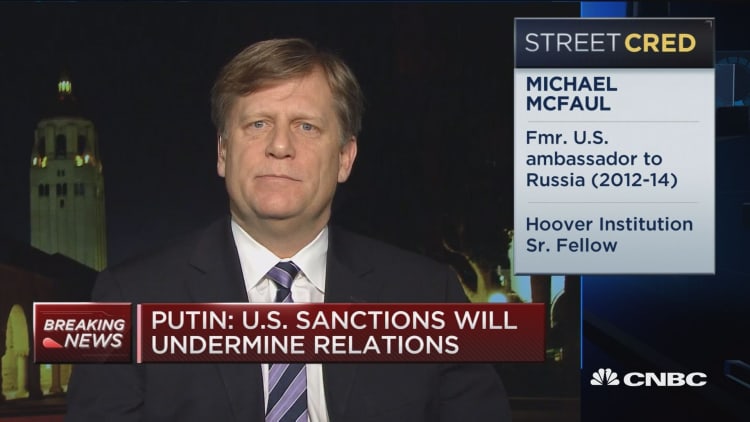
President Barack Obama's decision to expel 35 Russian diplomats and impose new sanctions on Moscow was necessary, given President-elect Donald Trump's "dismissive" comments about hacking reports, a former U.S. ambassador to Russia said Friday.
"I think most importantly what the Obama administration did yesterday was to assign direct attribution with overwhelming evidence with who interfered in our election process," Michael McFaul said on CNBC's "Squawk Box."
Obama announced the sanctions on Thursday, citing Russia's alleged involvement in hacking political groups in the 2016 presidential election. In a statement, Trump said, "It's time for our country to move on to bigger and better things."
"I thought it was necessary," McFaul said, referring to Obama's actions. "Especially given that the next president, President-elect Trump, has been so dismissive of the intelligence."
Trump did say Thursday he plans to meet with intelligence leaders next week for an update in the situation.
Russian President Vladimir Putin on Friday ruled out expelling anyone in retaliation for now to see what Trump does after he takes office on Jan. 20.
McFaul, who served as U.S. ambassador to Russia from 2012 to 2014, said Putin's response was unusual.
"Usually in one of these instances, there's a tit-for-tat response," he said. "And even Foreign Minister [Sergey] Lavrov already had put together the names of diplomats to expel. But obviously President Putin has decided he's going to wait and deal with the next guy."
Olga Oliker, senior adviser and director of the Russia and Eurasia Program at CSIS, said a "tit-for-tat" response is usually how major governments behave in such situations. She said Obama's decision makes it clear how the U.S. will respond to future allegations of election hacking.
"The new executive order provides a good bit of leeway there," Oliker said on "Squawk Box."
McFaul said Washington's action are not enough, and that more should be done about the alleged hacking.
"I still have 100 different questions about what happened and how the Obama administration responded to the intelligence that they received in real time during the election," McFaul said. "We can't just think of this as a bump in the road and move on."
One key challenge the Trump administration will face in 2017 is making the nation's systems more secure from cyber attacks, Former Assistant Attorney General John Carlin told CNBC on Friday.
"I think as we move towards this new approach of figuring out who did it, making it public and imposing consequences that we have to get faster at it," he said.
"What we're seeing is not just governments being target and not just companies — large, small, medium sized — by crooks, terrorist and spies, but we're seeing everyday users. Just because it happens through cyber enabled means doesn't mean you get away with a free pass," he said.


